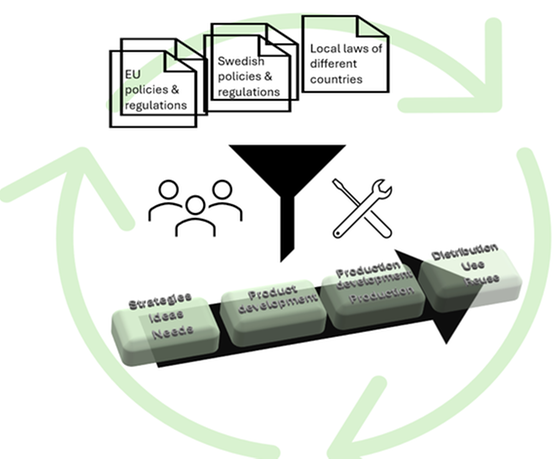%20(2)%20ReShare%20schematisk%20bild.png)
Bild: Wlazlak 250611
How can businesses better manage the flow of information in the green transition?
Within the ReShare project, researchers have collaborated with nine companies in the manufacturing and construction industries. The aim has been to investigate how companies collect, manage and use information on sustainability requirements in the product realization process. The study, led by Paraskeva Wlazlak, Senior Lecturer at JTH, has also looked at what challenges exist and what can be improved. The ReShare research project is part of GRACE, a strategic research programme.
How do companies collect information on sustainability requirements?
As sustainability requirements increase, companies need to keep track of more and more rules, policies and standards. For example, new environmental requirements from the EU or guidelines on how to produce products in a sustainable way. Companies use a variety of sources, such as websites, databases, subscription services, and also participate in industry associations and standardization groups to stay up-to-date. However, this work is often fragmented and dependent on individuals. Larger companies tend to have clear procedures, while smaller companies can be more vulnerable and dependent on key individuals.
What are the main challenges?
The study shows that there is a need for better structure and support to collect and integrate sustainability requirements throughout the product realization process. Together with the companies, we have identified two main types of challenges, organizational and technical.
On the organizational side, it is about clear division of responsibilities, workload and collaboration between different actors such as customers, suppliers, other companies and consultants. A common challenge is that sustainability issues are not always considered in decision-making. The way work is organized is also influenced by factors such as company size, whether the company operates in a global or national market, and the industry it belongs to.
On the technical side, there is often a lack of systemic support for collecting, structuring and disseminating information on sustainability requirements. Many companies still rely on manual solutions, making it difficult to ensure traceability and reliable information. This often makes the work more reactive than proactive. Other technical challenges include the need for tools to calculate environmental impacts, manage requirements in a systematic way and report against rules and standards in an efficient way.
What support is needed for the future?
To succeed in the green transition, companies need better tools to collect, structure and disseminate information on sustainability requirements, both organizationally and technically, throughout the product realization process.
Organizationally, it is about clarifying roles, responsibilities and collaboration - both internally and with external actors such as customers and suppliers. Sustainability aspects need to be more clearly integrated into decision-making and valued as highly as technical and economic requirements.
The project will continue to develop methods and tools for systematic requirements management and explore how sustainability can become an integral part of product realization.
Although many companies have taken important steps in the green transition, the study shows that support needs to be strengthened to handle increased requirements and increased complexity. With the right structure, tools and collaboration, companies can both meet future demands and strengthen their competitiveness.
The researchers involved in the work package 1 in the ReShare project, are Paraskeva Wlazlak, Gustav Jansson, Dag Raudberget, Djordje Popovic, and Fredrik Elgh.


